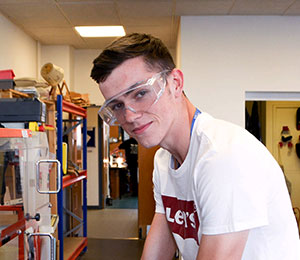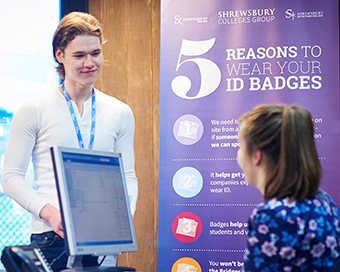Plate Welder (Level 3 Standard)
| Mode of study | Apprenticeship |
| Duration | 3 Years |
| Campus | London Road Campus |
| Start date | 1 August 2024 |
| Course code | PLR3UPL (APPO) |
-
Entry Requirements
In order to complete this welding Apprenticeship, you will be expected to complete an initial assessment in Maths and English to ensure you are at a suitable level to work towards this qualification. Some employers will specify their own minimum qualification entry requirements, which would be detailed within their Apprenticeship vacancy.
-
What does the course involve?
This occupation is found in a wide range of sectors associated with the Fabrication, Construction and upgrade of major capital plant items and facilities. This will include Structural Steel fabrication and construction (e.g. Buildings, Stadia, Bridges, Piers, Jetties etc.), Marine fabrication, construction and upgrade (Ships, Submarines, Wind Turbine Towers), Defence fabrication (armoured vehicles), Process Plant (structures and storage tanks), Engineering Construction (Lifting Beams, Cranes, Construction Vehicles etc.), Mining & Mineral Processing (Shuttering, Structural Supports, Wear Plates, Chutes, Mills, Pulverisers), Transport (Aerospace, Rail and Automotive), and Manufacturing of machinery & equipment. Plate Welders may be employed in any size of organisation from small companies to large multi-national organisations.
The broad purpose of the occupation is to manually weld plate and structural components to high standards of quality. This will involve fabrication, construction or repair of fabricated plate assemblies, extrusions and structural components (e.g. Channel, H-Beams, I-Beams etc.) used often used to fabricate larger components and assemblies. Plate welders will weld to internationally recognised quality standards using more than one manual arc welding process from Tungsten Inert Gas (TIG), Plasma Arc Welding (PAW), Manual Metal Arc (MMA), Metal Inert Gas (MIG)/Metal Active Gas (MAG) and Flux Cored Arc Welding (FCAW) on more than one material group from Carbon Steel, Low Alloy Steel, High Alloy Ferritic/Martensitic Steel, Austenitic Stainless Steel, Nickel & Nickel Alloys, Aluminium & Aluminium alloys, Titanium & Titanium Alloys, Copper & Copper Alloys. For example, a Plate Welder might use Manual Metal Arc (MMA) and Flux Cored Arc Welding (FCAW) to join both Carbon Steel and Low Alloy Steel materials.
For a comprehensive understanding of this programme and what it entails, please click here.
-
How is the course assessed?
This welding Apprenticeship is taught at our London Road campus on a day release basis, attending college 2 days a week in the first year and 1 day a week in the second year. If you need to complete your functional skills, then this will be covered at college in a block week release. In addition, you will be assessed in the workplace by your assessor and progress reviewed every 12 weeks with your employer. In addition, you will be required to sit an End Point Assessment, towards the final stages of your programme, which will ensure you have obtained the skills, knowledge and behaviours required to carry out your role effectively.
-
Additional Notes
Typically, this Apprenticeship will take 3 years to complete, plus the End Point Assessment period.
-
What do I do next?
To be a Plate Welder apprentice, you will need an employer who can offer you a specific role relevant to this apprenticeship and release you for your training. Once you have an employer in place, you can apply online. If after reading this fact sheet, you are still undecided about the course most suitable for you, please drop in to one of our Advice Events, ring the Apprenticeship Team on 01743 653 460 or email This email address is being protected from spambots. You need JavaScript enabled to view it.

Jason Roberts
A Level Product Design (Maths, Physics)
Previous school: The Priory School
Product Design gives you a lot of options for your future. I enjoyed the project where we had to make something out of a generic Ikea stool – I created an adjustable table. After College I would like to do an Apprenticeship with JLR.

Gemma Elliot
Foundation Degree in Electrical and Electronics Technology
Previous Institution: Llanfyllin High School
My Foundation Degree is funded by the engineering firm James Fisher. I’m learning so much and absolutely loving it.

Samantha Pitchford
Level 2 Fabrication and Welding
Previous school: Charlton School
I’m a practical person, so I wanted to do something with my hands. I didn’t have any experience before, but the teachers were really good at guiding me through. I’m a bit of a perfectionist, so the fact that the staff let me work to my own pace really helped. I have now secured an Apprenticeship with Caterpillar in Shrewsbury, and I can see myself being there for some time. I’m sure it wouldn’t have happened unless I’d been on this course as at my interview they seemed really impressed with what I was doing.

Austin Luzadas
Level 3 in Engineering
Previous school: Holy Trinity School, Telford
Level 2 was mostly practical and this year on Level 3 there is a lot of theory and it's preparing me for university. I live outside of Shrewsbury and the transport links to the College are good.
Career Options
Are you an employer?
See how an apprentice can help your business.








